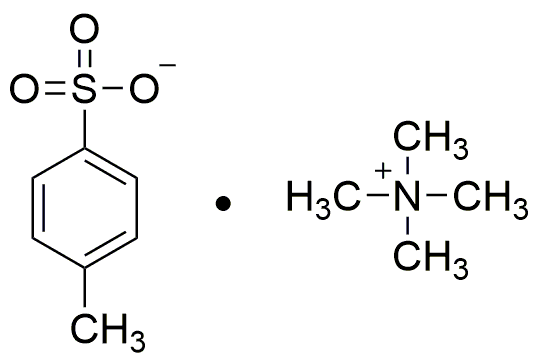Tetramethylammonium p-toluenesulfonate is widely utilized in research focused on:
- Organic Synthesis: This compound serves as a phase transfer catalyst, enhancing the efficiency of reactions between organic and inorganic substances, which is crucial in the synthesis of pharmaceuticals and agrochemicals.
- Analytical Chemistry: It is used as a reagent in various analytical techniques, helping to improve the detection and quantification of specific compounds in complex mixtures, particularly in environmental and food analysis.
- Polymer Chemistry: The compound acts as a surfactant in the formulation of polymer materials, improving their properties such as solubility and stability, which is beneficial in the production of coatings and adhesives.
- Biotechnology: It is applied in the extraction and purification processes of biomolecules, facilitating the recovery of proteins and nucleic acids, thus supporting research in genetic engineering and drug development.
- Electrochemistry: This chemical is used in the development of electrochemical sensors, enhancing the sensitivity and selectivity of measurements, which is vital in monitoring environmental pollutants and in medical diagnostics.
General Information
Properties
Safety and Regulations
Applications
Tetramethylammonium p-toluenesulfonate is widely utilized in research focused on:
- Organic Synthesis: This compound serves as a phase transfer catalyst, enhancing the efficiency of reactions between organic and inorganic substances, which is crucial in the synthesis of pharmaceuticals and agrochemicals.
- Analytical Chemistry: It is used as a reagent in various analytical techniques, helping to improve the detection and quantification of specific compounds in complex mixtures, particularly in environmental and food analysis.
- Polymer Chemistry: The compound acts as a surfactant in the formulation of polymer materials, improving their properties such as solubility and stability, which is beneficial in the production of coatings and adhesives.
- Biotechnology: It is applied in the extraction and purification processes of biomolecules, facilitating the recovery of proteins and nucleic acids, thus supporting research in genetic engineering and drug development.
- Electrochemistry: This chemical is used in the development of electrochemical sensors, enhancing the sensitivity and selectivity of measurements, which is vital in monitoring environmental pollutants and in medical diagnostics.
Documents
Safety Data Sheets (SDS)
The SDS provides comprehensive safety information on handling, storage, and disposal of the product.
Product Specification (PS)
The PS provides a comprehensive breakdown of the product’s properties, including chemical composition, physical state, purity, and storage requirements. It also details acceptable quality ranges and the product's intended applications.
Certificates of Analysis (COA)
Search for Certificates of Analysis (COA) by entering the products Lot Number. Lot and Batch Numbers can be found on a product’s label following the words ‘Lot’ or ‘Batch’.
Numéro de catalogue
Numéro de lot/série
Certificates Of Origin (COO)
This COO confirms the country where the product was manufactured, and also details the materials and components used in it and whether it is derived from natural, synthetic, or other specific sources. This certificate may be required for customs, trade, and regulatory compliance.
Numéro de catalogue
Numéro de lot/série
Safety Data Sheets (SDS)
The SDS provides comprehensive safety information on handling, storage, and disposal of the product.
DownloadProduct Specification (PS)
The PS provides a comprehensive breakdown of the product’s properties, including chemical composition, physical state, purity, and storage requirements. It also details acceptable quality ranges and the product's intended applications.
DownloadCertificates of Analysis (COA)
Search for Certificates of Analysis (COA) by entering the products Lot Number. Lot and Batch Numbers can be found on a product’s label following the words ‘Lot’ or ‘Batch’.
Numéro de catalogue
Numéro de lot/série
Certificates Of Origin (COO)
This COO confirms the country where the product was manufactured, and also details the materials and components used in it and whether it is derived from natural, synthetic, or other specific sources. This certificate may be required for customs, trade, and regulatory compliance.


